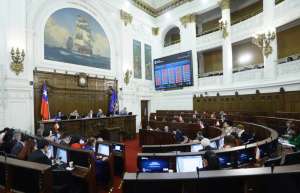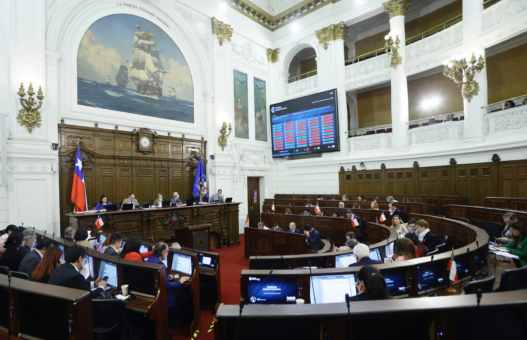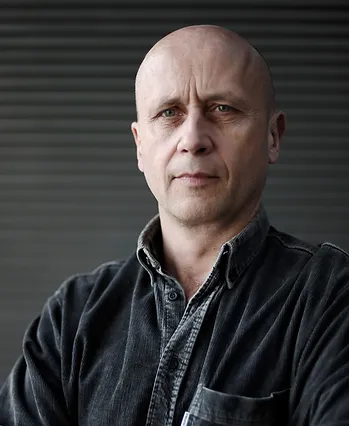
CHILE REMAINS WITHOUT A NEW CONSTITUTION AND THE SECOND DRAFT IS NOT LIKELY TO WIN IN THE REFERENDUM
By Maciej Stasiński, head of the International section of the Polish daily Gazeta Wyborcza.
November 28, 2023
The second draft of the new Chilean constitution will most likely be lost in a plebiscite, just like the first one a year ago. Why is it impossible to achieve a national consensus on the new rules of the political game?
On December 17, 2023, a referendum will be held in Chile to decide the fate of the next draft of the new Constitution, but it is already almost a foregone conclusion that the draft will lose. According to opinion polls, almost two-thirds of the 15 million Chileans eligible to vote (between 62% and 66%) will reject the second draft of the Constitution.
Consequently, the old one, promulgated by the military dictatorship in 1980, will remain in force, although it has been modified and democratized several times since then.
It also means that a four-year process of national debate on a new Constitution, which was triggered by the massive popular revolt for greater equality and social justice that swept Chile in 2018, will be wasted. One of the demands of the citizens then protesting in the streets was to draft a new Constitution that would break once and for all with the authoritarian legacy of the dictatorship of General Augusto Pinochet, as well as with the ultra-liberal economic principles established years earlier. This is what up to 80% of Chileans demanded in the 2019 plebiscite.
So why, after four years, still no sign of a breakthrough on a new constitution?
The second draft of the new constitution is opposed by almost the same percentage of Chileans who rejected the previous draft last September. Only that the two drafts are completely different, and the political forces supporting or rejecting them have switched roles.
Now it is the governmental left and the Socialist and Christian Democrat center-left, which have governed the country for most of the time since the restoration of democracy in 1990, that strongly oppose the new draft. Instead, they support the previous one, which the left drafted but Chileans rejected a year ago.
The new draft, on the other hand, has the support of the opposition right, including the new ultra-right (the Republican Party), which recognizes the legacy of the Pinochet dictatorship as its own, and of the traditional right-wing parties.
HOW DOES THE NEW PROJECT DIFFER FROM THE PREVIOUS ONE?
While the previous bill radically modified the Chilean system, the current one undoes it in some aspects.
The previous bill established a plurinational State, guaranteed the autonomy of minorities, replaced the Senate with a chamber of indigenous minorities and strengthened the role of the State in guaranteeing the right to education, health, insurance, pensions or housing, in addition to legalizing abortion and introducing gender equality.
Such progressive provisions gave the right wing a pretext to unleash a demagogic and often misleading campaign threatening Chileans with the loss of property, housing and savings, or even simply with anarchy and the annihilation of the unitary state.
When the process resumed in the spring of this year after the defeat of this project in the referendum, the right wing, which had obtained an absolute majority in the constitutional commission, presented a totally different project. It limits the role and powers of the state with a network of new private institutions. It also orders, among other things, the forced expulsion of illegal immigrants, allows the early release -for age and health reasons- of convicted criminals of the Pinochet dictatorship (there are still 134 behind bars), and establishes the protection of life from conception, which means revoking the right -introduced by law a few years ago- to abortion in case of rape, malformation of the fetus and danger to the life and health of the mother.
If the first project of the left was radical on some points, the new one is ultra-conservative and even authoritarian. However, neither establishes universally accepted constitutional principles that would accommodate a deeply ideologically divided society.
NO THIRD APPROACH TO THE CONSTITUTION
In addition to leftist President Gabriel Boric (who supported the previous draft), center-left leaders who built Chilean democracy after the Pinochet dictatorship, including former Presidents Ricardo Lagos and Michelle Bachelet, were also urged to vote “no” on the new draft.
“I am very disappointed and I will vote against,” Ricardo Lagos, who first encouraged moderation from the left and then criticized the right-wing radicalism of the authors of the second draft, declared recently in an interview. “Today we have to evaluate a partisan and ideological text drafted by forces that believe they have the right to impose their will on society as a whole. There is no chance that such a constitution will represent the people. The same was true of the previous draft. We do not understand that a constitution is not a political manifesto, but a legal framework. Democracy needs political parties, but the parties must learn to understand and listen to the people,” says Lagos.
After four years of discussions, propaganda and disputes over a Constitution that was supposed to be a boost and a new beginning for the country, Chileans are tired and discouraged. In a fortnight’s time, the majority will vote for or against the second draft of the Constitution, probably without having read it. What worries them most is the sense of security in the face of rising crime and illegal immigration. One out of three Chileans today fears for their own safety on the street. Only 22% are optimistic about the future.
There is consensus on only one thing: that there will be no third way for the new Constitution. For the left and the poorest majority of society, it will be a hard defeat. For the right and the economic elite, on the other hand, preserving the status quo will be a sure success, since it is essentially what they wanted from the beginning.
This text was originally published in the Polish newspaper Gazeta Wyborcza, with whose permission we reproduce it here.
Check the original text in Polish at this link.



